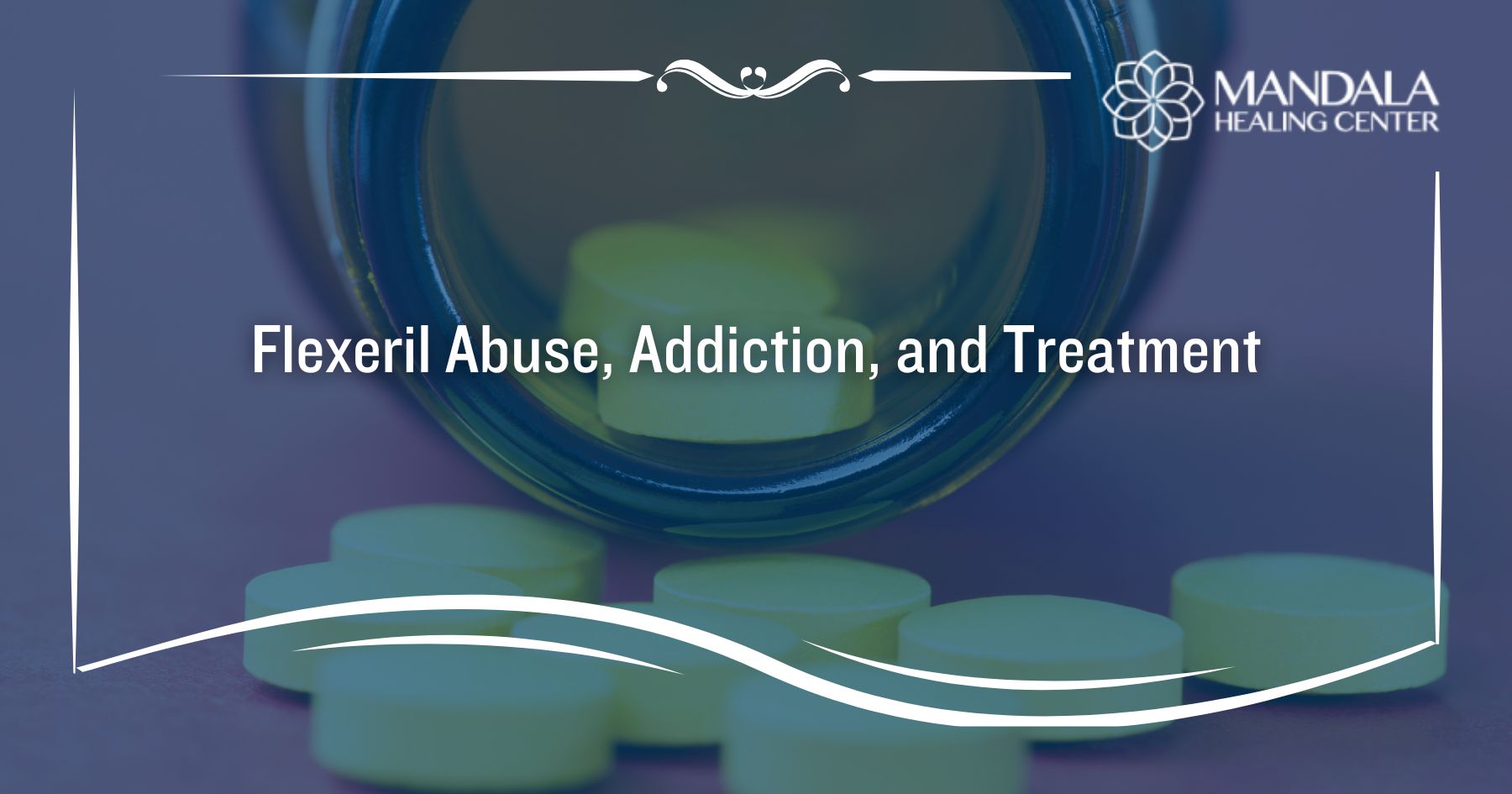Muscle relaxants are prescription medications used to treat muscle pain and relieve muscle spasms. Surgeons also use them to prevent muscle movement during surgeries. If you have chronic back or neck pain, you might be prescribed a muscle relaxant to manage your symptoms.
While muscle relaxants can be beneficial for chronic pain, they are also habit-forming and addictive. According to a study, there has been nearly a double increase in emergency department visits related to muscle relaxants in recent years.[1]
One of the most commonly prescribed muscle relaxants is known as Flexeril. This prescription medication is known for being addictive. If you or a loved one abuse Flexeril, the Mandala Healing Center can provide you with the tools and support you need to achieve long-term recovery.
In this article, you will learn:
- What is Flexeril?
- Is Flexeril addictive?
- How does treatment for Flexeril addiction work?
What is Flexeril?
Flexeril (cyclobenzaprine) is a prescription muscle relaxer that can treat pain and stiffness caused by muscle spasms. It works by blocking nerve impulses in the brain that lead to pain sensations. While Flexeril is not a controlled substance, it can still lead to physical dependence and addiction if misused.
The side effects of Flexeril include:[2]
- Dry mouth
- Dizziness and drowsiness
- Nausea and vomiting
- Heartburn
- Constipation
- Extreme tiredness and fatigue
Cyclobenzaprine can also cause severe and life-threatening side effects like skin rash, hives, swelling of the face or tongue, difficulty breathing, irregular or fast heart rate, and chest pain. If you experience any of these symptoms, contact emergency medical services immediately.
Taking Flexeril in high doses increases your risk of developing an addiction. The Flexeril high is associated with symptoms like euphoria, calmness, and drowsiness.
Because it can take a large amount of cyclobenzaprine to experience a high, you could experience an overdose. This medication acts as a central nervous system (CNS) depressant, which means an overdose could include effects like difficulty breathing, unconsciousness, and a blue tint to the fingernails or lips.[3] If you believe you are experiencing a Flexeril overdose, contact 911 immediately.
Is Flexeril Addictive?
Flexeril has a potential for abuse. Additionally, abusing Flexeril long-term can lead to addiction. Knowing the signs of cyclobenzaprine addiction can help you determine whether you need help from a substance abuse treatment program.
The signs of Flexeril addiction include:
- Using Flexeril for longer or in higher doses than you intended to
- Wanting to cut back on or quit Flexeril abuse but being unsuccessful
- Spending a lot of time obtaining or using Flexeril
- Experiencing urges or cravings to abuse Flexeril
- Losing interest in previously enjoyed activities to have more time to use Flexeril
- Failing to meet responsibilities at home, school, or work due to Flexeril use
- Continuing to use Flexeril despite facing social problems or physical and mental health issues
- Using Flexeril in dangerous situations, such as while driving
- Needing to increase your dose of Flexeril to experience the desired effect
- Experiencing withdrawal symptoms when you stop using Flexeril
If you notice 2 or more of the above symptoms, you have a substance use disorder. If you experience withdrawal symptoms when you stop using Flexeril, you need to attend a detox program that provides medical supervision and FDA-approved medications.
How is Flexeril Addiction Treated?
Having an addiction to Flexeril can be difficult. Long-term substance abuse makes it difficult to complete daily tasks, affects your mental health, and leads to physical health issues like organ damage. Thankfully, drug addiction treatment centers can provide you with the help you need to achieve long-term sobriety and heal both physically and mentally.
During an addiction treatment program for Flexeril, you’ll participate in the following services:
- Medical detox to overcome withdrawal
- Individual therapy to address the root causes of addiction
- Group counseling to develop life-saving coping mechanisms
- Holistic treatments like meditation and yoga to heal the mind, body, and spirit
- Psychoeducational support groups that increase your education on substance use disorders
- Family therapy to help you develop supportive relationships with your loved ones
- Relapse prevention planning to ensure you can maintain your sobriety outside of treatment
- Aftercare services like continued therapy and access to an alumni support group to keep you connected with a recovery program once you complete treatment
If you are dealing with Flexeril abuse, attending a program like the Mandala Healing Center can help you take back control over your life. By using individualized treatment planning, our program ensures you get the type of support you need to recover.
Get Connected to a Flexeril Rehab Center
If you or a loved one suffers from Flexeril addiction, it’s time to seek professional help. The Mandala Healing Center uses individualized and evidence-based treatments to help you achieve long-term recovery. Our programs include services like medical detox, behavioral therapies, holistic treatments, and relapse prevention planning.
Contact us today to learn more about our Flexeril addiction treatment center.
References:
- The National Library of Medicine (NLM): Considerations for the Appropriate Use of Skeletal Muscle Relaxants for the Management Of Acute Low Back Pain
- Medline Plus: Cyclobenzaprine
- Science Direct: Overdose of cyclobenzaprine, the tricyclic muscle relaxant
















